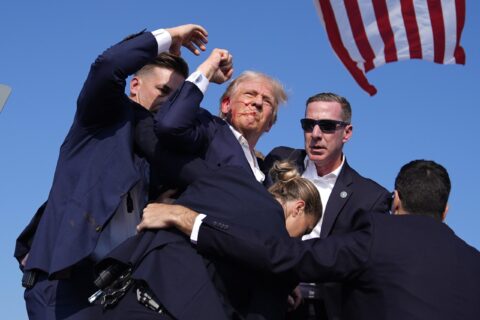Political assassination has been thankfully rare in recent decades (with a few exceptions), and the attempted assassination of Donald Trump in Butler, Pennsylvania is the first such attack on a US president or presidential candidate to make the news since Ronald Reagan survived John Hinckley’s attempt in 1981:

Donald Trump, surrounded by Secret Service agents, raises his fist after an attempt on his life during a campaign speech in Butler, PA on 13 July, 2024. One spectator was killed and two others were reported to be in critical condition. The shooter was killed by Pennsylvania State Troopers, according to reports in the succeeding hours.
The attempted assassination of Donald Trump is unfortunately far from the first against an American president. Four presidents have been assassinated (Abraham Lincoln in 1865, James A. Garfield in 1881, William McKinley in 1901, and John F. Kennedy in 1963), but our history has seen numerous other unsuccessful shootings targeting the nation’s chief executive: against Andrew Jackson, Teddy Roosevelt, Franklin D. Roosevelt, Harry Truman, Gerald Ford (twice), Ronald Reagan, and now Trump.
The first of these unsuccessful attempts came against Andrew Jackson in 1835. An unemployed house painter named Richard Lawrence came at Jackson with a pistol while the president was in the U.S. Capitol attending the funeral of South Carolina representative Warren R. Davis. Lawrence pulled the trigger and attendees heard a crack, but the pistol misfired. Jackson turned on Joseph and swung his cane at the assailant, who took out another pistol, which also misfired. A melee ensued with Jackson screaming, “Let me alone! Let me alone! I know where this came from”, suggesting that Jackson’s Whig enemies had sent the assassin. Among those who tried to subdue Joseph was Davy Crockett, who later said of the incident, “I wanted to see the damndest villain in the world and now I have seen him”. Jackson was unharmed but became more paranoid as a result of the close call. It was a contentious period in American politics; the New York Evening Post deemed incident “a sign of the times.” Joseph spent the rest of his life in a mental institution.
The next three shootings of presidents were unfortunately successful ones; it’s remarkable to consider now that these three assassinations took place over just 36 years, from 1865 to 1901. (What must Americans have thought of “our democracy” then?) The next failed attempt did not come until Teddy Roosevelt’s ill-fated effort to reclaim the presidency in 1912 as a third party candidate. In October of that year, Roosevelt was campaigning in Milwaukee — the site of this year’s Republican convention — when a man named Joseph Schrank shot the former president in the chest. Roosevelt was fortunate that his folded 50-page speech was in his chest pocket and slowed the bullet. The bullet did pierce Roosevelt’s chest but did not penetrate too deeply. The crowd attacked Schrank, but Roosevelt asked that they not harm him, which probably saved Schrank’s life. Roosevelt then went ahead with his speech, famously saying, “it takes more than that to kill a bull moose”. This event has perhaps the most similarities to the Trump shooting, as both Trump and TR were ex-presidents looking to return to the White House, and both Trump and Roosevelt showed defiance after being bloodied.
TR’s cousin Franklin was president-elect in February 1933 when an anarchist named Giuseppe Zangara fired five shots at him and Chicago Mayor Anton Cermak in Miami. The would-be assassin missed Roosevelt but hit Cermak and four other people. Roosevelt was likely saved by Miami housewife Lillian Cross, who pushed Zangara’s arm as he was firing. A gravely wounded Cermak told Roosevelt, “I’m glad it was me instead of you”. He died on March 6, two days after hearing Roosevelt’s inaugural address over the radio. Zangara was executed by electric chair two weeks later.
[…]
Before the Trump attack, the most recent shooting of a president was John Hinckley’s attack on Ronald Reagan in 1981. Reagan was early in his first term and was leaving a speech at the Washington Hilton (now referred to as the Hinckley Hilton by Washingtonians), when Hinckley opened fire, hitting Reagan press secretary Jim Brady, Secret Service agent Tim McCarthy, and DC police officer Thomas Delahanty. Reagan’s protective detail threw him to the floor of his limousine and, thinking he was unharmed, took off back for the White House. Like Ford, Reagan did not like being under a pile and thought the agents had broken his rib. When the president coughed up blood, agent Jerry Parr recognized that Reagan had been hit as well and immediately redirected the limo to George Washington Hospital. This decision saved the president’s life. Even so, it was a close call. A paramedic thought upon seeing a gray-colored Reagan, “My God, he’s code city”, ER lingo for someone who isn’t going to make it.
I have to admit to knowing a bit more than the average person about prior presidential assassination attempts thanks to Stephen Sondheim’s soundtrack to the musical Assassins, which I’ve enjoyed listening to many times over the years.
Niall Ferguson on the historical context of political assassinations (the rest of the article is behind the paywall:
“There was a reason why Rome of Julius Caesar and Florence of the Medici were such dangerous places. Assassination was a feature, not a bug, of republican political systems. However, modern American medicine and the overblown security provided to presidents and former presidents together make it quite likely that both candidates will make it to November 5.”
I wrote those words on July 2. Eleven days later, events proved me both right — assassination is part and parcel of republican political systems — and wrong: this has ceased to be true of the United States.
What happened in Butler, Pennsylvania, on the evening of July 13, is in equal measure shocking and baffling. An inch or two further to the left and the bullet that grazed Donald Trump’s ear would have penetrated his skull and very likely killed him. A slight gust of wind, a tremor of the assassin’s hand, an unexpected move by the former president — for whatever tiny reason, Trump lived to fight another day.
The shooter, Thomas Matthew Crooks, a 20-year-old man from nearby Bethel Park, was a registered Republican but had made a $15 donation to the liberal ActBlue political action committee on the day of Joe Biden’s inauguration, when he was 17. Even more puzzling, this young man (who was barely a teenager when Trump was elected in 2016) was able to take several clear shots at the 45th president from the roof of a factory 130 yards away from the stage of Trump’s rally.
How did the Secret Service snipers stationed just 430 feet away not spot Crooks climbing into position on the roof, when at least one member of the public did see him and claimed that he had warned them? It is hard to think of a good explanation.
And what of the consequences? There are those who would have you believe that history is governed by vast impersonal cycles and that events such as this are mere epiphenomena, historical trivia. It is a claim as old as it is false.
The editors at The Line suspect the US Presidential election has now been decided months before any ballots are cast:
The prospect of someone deciding to take the rhetoric to its most extreme albeit logical conclusion — if Trump is a threat to life as we know it, the threat must be ended — cannot come as a surprise. At this time, we don’t know much about the 20-year-old shooter, Thomas Matthew Crooks, beyond his name, the fact that he was a registered Republican but, also, a one-time donor to a progressive political action committee. We await more information, and hope there aren’t many more like him waiting to try again, or retaliate against a Democratic politician.
For now, we at The Line are pondering what’s next. July 13, 2024 is going to be one of those days that future historians look back upon with a certain wistfulness. If the wind was a little harder, a bullet lands a few inches in another direction, and Donald Trump is dead. In this timeline, though, the shooter missed, and now America is going to witness first hand the problems with relying on violence to secure political outcomes. Namely, it very often backfires.
Because we’ve taken the other fork in the road. We now exist in the other timeline of history — the one in which Donald Trump is now the far-and-away favourite to win a second term.
We could be wrong about this. No one can predict the future, and there are lots of scenarios still unplayed out. Does Biden step down in favour of Kamala Harris? Does the shooting turn out to be a hoax perpetrated by Trump or his supporters? Does Trump suffer a heart attack between now and November? Does someone else get shot? Any of these possibilities is still available, and any one could further change the outcome.
However, at this moment in time, it was hard for us to look at the picture of Trump standing up once the bullets had struck, demanding to be seen by the crowd even as his Secret Service detail tries to get him off the stage, pumping his fist in the air, all framed by an American flag, and think anything but “Well, that’s the ballgame.”
The Line is no fan of Trump, but we are also political observers, and Trump’s handling of the assassination attempt, as political showmanship, was absolutely perfect. Trump displayed an incredible presence of mind in the midst of mortal peril. While the echoes of the gunshots were still ringing, he understood that he needed to forgo some small degree of further protection in order to show his supporters — and the world — that he was fine. No one has to like the guy, or ignore the real risks he poses both to American and Canada, but we do have to respect how he handled that moment, if nothing else. It demonstrated calm nerves and competency under literal fire.
The response shored up Trump’s strengths in a way that highlighted Joe Biden’s comparative frailty. The shooting will absolutely supercharge Trump’s supporters, his base, his cult. There’s no coming back from it.
We don’t know what more to say here, folks. For the record, we at The Line rule out nothing at this early juncture. But if the momentum of history holds on its current track, there’s a very good chance that the next American election is over weeks before anyone bothers to cast a ballot.




